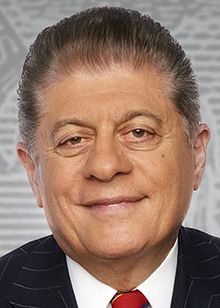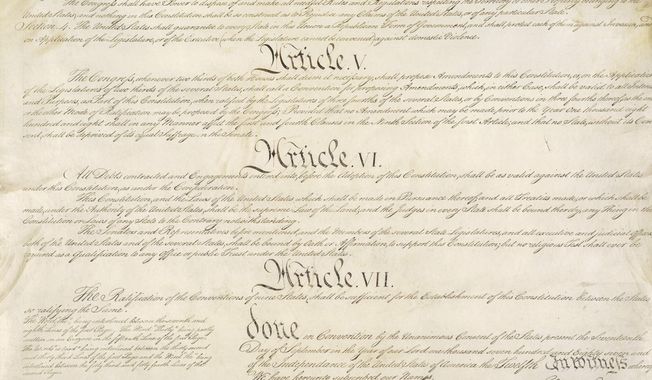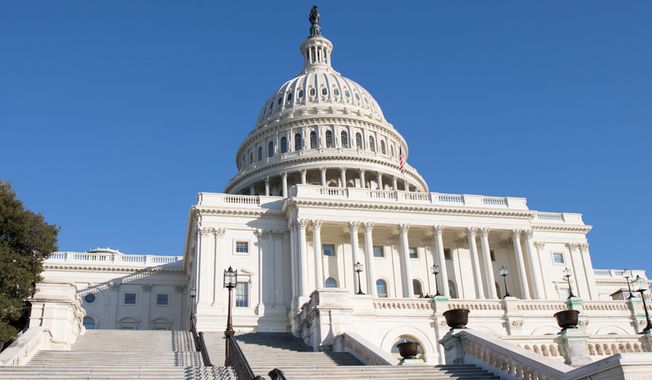Andrew P. Napolitano
Articles by Andrew P. Napolitano
Trump, health care transparency is moot because government has no say in health care
Many of my media colleagues have been lauding President Donald Trump for signing an executive order earlier this week directing the federal Department of Health and Human Services to require health care providers to inform patients in advance of the true costs of medications and services. Published June 26, 2019
Can government punish twice for the same crime?
Last week, this column discussed the unconstitutional efforts of federal prosecutors in Chicago to punish an American citizen for crimes that had not yet been committed. This week, I address the wish of federal prosecutors in Alabama to charge and to punish a man for a crime for which he had already been convicted and punished. Published June 19, 2019
Trashing the Constitution again
While the eyes of the political and media classes were on President Donald Trump as he commemorated the 75th anniversary of D-Day in the United Kingdom and in France last week, and then as we all watched for progress in the tariff war Mr. Trump started with Mexico, the Department of Justice was quietly trying to persuade a federal judge in Chicago to abandon first principles with respect to citizenship and sentencing. Published June 12, 2019
Mueller stirs the pot
Last week, special counsel Robert Mueller — who had been appointed by the Department of Justice two years earlier to investigate the nature and extent of Russian attempts to influence the outcome of the 2016 presidential election and to determine, if those attempts did occur, whether the Russians had any willing American collaborators in the Trump campaign — came to the cameras and announced his resignation. Published June 5, 2019
Julian Assange indictment runs counter to the Supreme Court decision on Daniel Ellsberg
When James Madison agreed be the scrivener at the Constitutional Convention during the summer of 1787, he could not have known that just three years later he'd be the chair of the House of Representatives committee whose task it was to draft the Bill of Rights. Published May 29, 2019
To impeach or not to impeach
The revelation last weekend by Michigan Republican Congressman Justin Amash that he believes the Mueller report accuses President Donald Trump of impeachable offenses has ignited firestorms in both major political parties on Capitol Hill. Mr. Amash's argument is simple and essentially unassailable, though his fellow congressional Republicans don't want to hear it and Democrats don't know what to do with it. Published May 22, 2019
For many years, the fear of a president as king was unthinkable, but now it’s not
There was a time in American history — nearly all of it up to the presidency of Woodrow Wilson — when the federal government followed basic constitutional norms. With some unique and discrete exceptions, like the Civil War, Congress wrote the laws, the president enforced them, whether he agreed with them or not, and the judiciary interpreted them and assessed their compatibility to the U.S. Constitution. This is the separation of powers. Published May 15, 2019
Did the attorney general deceive Congress?
William Barr, the attorney general of the United States, now faces a likely contempt citation for failing to comply with a congressional subpoena and for misleading Congress. Published May 8, 2019
Can William Barr defend presidential obstruction?
One should expect fireworks this week as Attorney General William Barr testifies before the Judiciary Committees of both the House and the Senate about the investigation and the report of special counsel Robert Mueller regarding Russian interference in the 2016 American presidential election. By now, most folks know that the interference was substantial but don't seem to care much. Published May 1, 2019
Did Donald Trump obstruct justice?
When the Department of Justice designated Robert Mueller as special counsel to take over the FBI investigation of the Trump campaign in May 2017, Mr. Mueller's initial task was to determine if there had been a conspiracy — an illegal agreement — between the campaign and any Russians to receive anything of value. Published April 24, 2019
The Resurrection of Jesus Christ is the linchpin of human existence
When America was in its infancy and struggling to find a culture and frustrated at governance from Great Britain, the word most frequently uttered in pamphlets and editorials and sermons was not "safety" or "taxes" or "peace"; it was "freedom." And two intolerable acts of Parliament assaulting freedom broke the bonds with the mother country irreparably, precipitating the Revolution. Published April 17, 2019
If Robert Mueller found no evidence of conspiracy and obstruction, William Barr would have said so
When Attorney General William Barr released his four-page assessment of Special Counsel Robert Mueller's 400-page report, I was disappointed at many of my colleagues who immediately jumped on board the "no collusion" and "no obstruction" and "presidential exoneration" bandwagons. Published April 10, 2019
Is the Affordable Care Act unconstitutional?
Here we go again. The legal battle over the constitutionality of the Affordable Care Act -- Obamacare -- will soon be back in court due to the largely unexpected consequences of a series of recent events. Published April 3, 2019
Beyond the Barr revelation
Last Sunday afternoon, U.S. Attorney General William Barr released a letter, which he said summarized the report he had received from special counsel Robert Mueller about alleged crimes committed by President Donald Trump. Published March 27, 2019
Can the president legally break the law?
Legal scholars have been fascinated for two centuries about whether an American president can break the law and remain immune from prosecution. During the Civil War, Abraham Lincoln ordered troops to arrest, without warrant, and incarcerate, without due process, many peaceful, law-abiding journalists and newspaper editors -- and even a member of Congress -- in the Northern states. Wasn't that kidnapping? Published March 20, 2019
Can Congress amend the Constitution?
"Emergency does not create power. Emergency does not increase granted power or remove or diminish the restrictions imposed upon power granted or reserved. The U.S. Constitution was adopted in a period of grave emergency. Its grants of power to the federal government and its limitations of the power of the States were determined in the light of emergency, and they are not altered by emergency." — Chief Justice Charles Evans Hughes (1862-1948) Published March 13, 2019
President Trump’s bad week
In an ideal world, the president of the United States would succeed in negotiating a nuclear arms treaty with a foreign government. Published March 6, 2019
‘Gun violence is the real emergency’
Earlier this week, House Speaker Nancy Pelosi told a group of supporters and journalists that in her view, gun violence is the real emergency. Such a statement, in the context in which she made it, should send shivers down the spines of all who believe in personal liberty protected by the U.S. Constitution. Published February 27, 2019
Trump’s brazen unconstitutional overreach
Last week, President Donald Trump followed through on a threat he had been making for months. It was not a blistering or insulting tweet. It was not an attack on the press or congressional Democrats. It was an attack on the U.S. Constitution. Published February 20, 2019
How the First Amendment protects a former White House communications aide and his book
While the public discourse has been consumed over the realization that abortion physicians actually let viable babies who survive late-term abortions die — as well as whether President Donald Trump or House Speaker Nancy Pelosi will blink first over the issue of congressional authorization for building a wall at the country's southern border, to say nothing of the race-and-sex-infused mess at the top of the government in Virginia — a profound free speech issue has been bubbling below the radar. Published February 13, 2019























